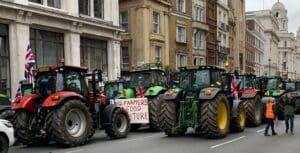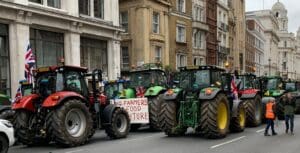
Britain’s farmers are warning of a crisis after a new poll revealed widespread fears over survival and an overwhelming rejection of Labour’s agricultural policies.
According to research by the Country Land and Business Association (CLA), which represents 28,000 farmers and rural businesses across England and Wales, almost 80 per cent of farmers are worried their business will not survive the next ten years. None of those surveyed said they would vote for Labour in a general election.
The poll, conducted among 490 CLA members, found that 40 per cent “strongly agree” and 38 per cent “agree” with the statement: “I am worried that my business will not survive the next ten years.” More than 30 per cent have “seriously” considered selling their farm and leaving the industry in the next five years.
Nearly 70 per cent say they will be forced to sell land or take on debt to keep their business running, while almost half expect they will have to sell at least a quarter of their farm.
The anxiety stems largely from Labour’s inheritance tax reforms. From April 2026, inherited agricultural assets worth more than £1 million will face a 20 per cent tax charge. Previously, such assets were exempt. The government expects the policy to raise £520 million annually by 2029.
Since the announcement last October, around 90 per cent of farmers have delayed or paused investment, with more than a quarter holding back over £150,000.
Victoria Vyvyan, president of the CLA, said: “The Treasury says these reforms will barely touch rural Britain. Our polling shows they will force hard choices on farms that have sustained communities for generations — selling land, laying off staff and shelving plans for the future. Already families are weighing up which parts of their business they can afford to keep. Some are holding back investment, others are wondering if they can hand the farm on at all.”
The poll revealed striking political consequences. While 38 per cent of farmers said they would back the Conservatives, 36 per cent favoured Reform UK. The Liberal Democrats attracted just under 4 per cent, while 21 per cent were undecided. Labour secured zero support.
Vyvyan warned that rural Labour MPs risked losing the trust of their communities if they backed the policy. “If they support it, their voters won’t forget,” she said.
The inheritance tax changes come on top of a string of challenges for British agriculture. The National Farmers Union (NFU) warns that many medium-sized farms will not generate enough income to pay the tax without selling off land, making their businesses unviable.
Other pressures include rising production costs, global market volatility, new regulations and the collapse of government support schemes. The sudden closure of the Sustainable Farming Incentive (SFI) programme in March, which had paid more than 50,000 farms to improve soil and boost biodiversity, was described by the NFU as another “shattering blow”.
The Commons environment, food and rural affairs committee has urged ministers to delay the inheritance tax changes by at least a year, citing a lack of consultation, impact assessment and affordability analysis.
Defra has defended the reforms, arguing that most family farms will not be affected. A spokesperson said: “Our commitment to farming is steadfast and farming profits in the UK increased by £1.6 billion last year. We have allocated a record £11.8 billion to sustainable farming over this parliament and appointed former NFU president Baroness Minette Batters to recommend further reforms to boost farmers’ profits.”
Officials point out that 40 per cent of agricultural property relief — worth £219 million — went to just 117 large estates. The Treasury insists the reforms are “vital” to raise money for public services.
Yet with confidence collapsing and farmers openly questioning their future, the political and economic fallout of the reforms is set to be a defining test for Labour’s relationship with the countryside.
Read more:
Farmers warn of crisis as poll shows 80% fear for survival and none back Labour

